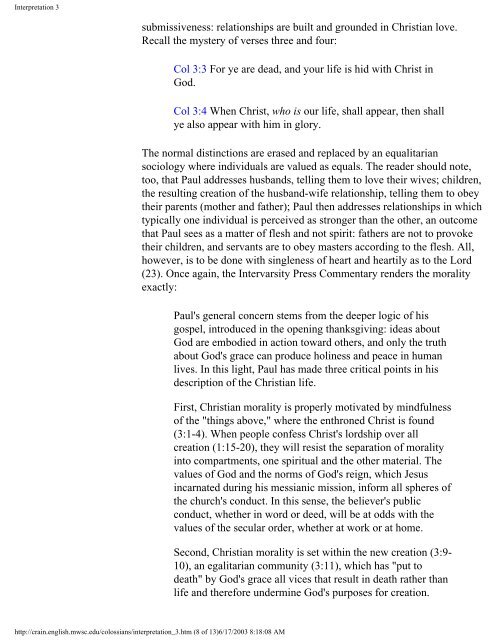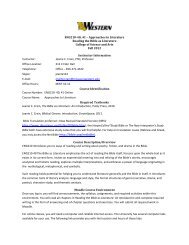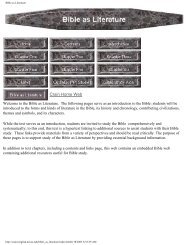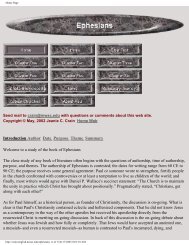Introduction to Colossians: Authorship, Date, Audience - Crain Home
Introduction to Colossians: Authorship, Date, Audience - Crain Home
Introduction to Colossians: Authorship, Date, Audience - Crain Home
You also want an ePaper? Increase the reach of your titles
YUMPU automatically turns print PDFs into web optimized ePapers that Google loves.
Interpretation 3<br />
submissiveness: relationships are built and grounded in Christian love.<br />
Recall the mystery of verses three and four:<br />
Col 3:3 For ye are dead, and your life is hid with Christ in<br />
God.<br />
Col 3:4 When Christ, who is our life, shall appear, then shall<br />
ye also appear with him in glory.<br />
The normal distinctions are erased and replaced by an equalitarian<br />
sociology where individuals are valued as equals. The reader should note,<br />
<strong>to</strong>o, that Paul addresses husbands, telling them <strong>to</strong> love their wives; children,<br />
the resulting creation of the husband-wife relationship, telling them <strong>to</strong> obey<br />
their parents (mother and father); Paul then addresses relationships in which<br />
typically one individual is perceived as stronger than the other, an outcome<br />
that Paul sees as a matter of flesh and not spirit: fathers are not <strong>to</strong> provoke<br />
their children, and servants are <strong>to</strong> obey masters according <strong>to</strong> the flesh. All,<br />
however, is <strong>to</strong> be done with singleness of heart and heartily as <strong>to</strong> the Lord<br />
(23). Once again, the Intervarsity Press Commentary renders the morality<br />
exactly:<br />
http://crain.english.mwsc.edu/colossians/interpretation_3.htm (8 of 13)6/17/2003 8:18:08 AM<br />
Paul's general concern stems from the deeper logic of his<br />
gospel, introduced in the opening thanksgiving: ideas about<br />
God are embodied in action <strong>to</strong>ward others, and only the truth<br />
about God's grace can produce holiness and peace in human<br />
lives. In this light, Paul has made three critical points in his<br />
description of the Christian life.<br />
First, Christian morality is properly motivated by mindfulness<br />
of the "things above," where the enthroned Christ is found<br />
(3:1-4). When people confess Christ's lordship over all<br />
creation (1:15-20), they will resist the separation of morality<br />
in<strong>to</strong> compartments, one spiritual and the other material. The<br />
values of God and the norms of God's reign, which Jesus<br />
incarnated during his messianic mission, inform all spheres of<br />
the church's conduct. In this sense, the believer's public<br />
conduct, whether in word or deed, will be at odds with the<br />
values of the secular order, whether at work or at home.<br />
Second, Christian morality is set within the new creation (3:9-<br />
10), an egalitarian community (3:11), which has "put <strong>to</strong><br />
death" by God's grace all vices that result in death rather than<br />
life and therefore undermine God's purposes for creation.






![[38cb1273][0][sourcelist][1][0] - Crain Home](https://img.yumpu.com/2168350/1/190x245/38cb12730sourcelist10-crain-home.jpg?quality=85)